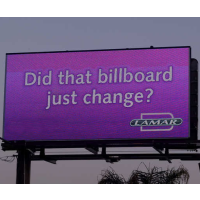Local Judge Tosses L.A. Billboard Ban Accepted by Federal Court

A Los Angeles County court has struck a blow for unrestricted free speech—and unlimited urban blight—by billboard companies.
Superior Court Judge Luis A. Lavin ruled that L.A. city restrictions preventing Lamar Central Outdoor from operating 45 electronic billboards violated the California Constitution. His decision, which struck down L.A.’s 2002 sign ordinance, openly contradicted a decision in 2011 by the U.S. Ninth Circuit Court of Appeals, which he was neither “required nor inclined to follow.”
Instead, the judge embraced a nonbinding Oregon Supreme Court decision that turned on state constitutional language similar to California’s, which he said was even broader in its protections than the First Amendment freedom of speech.
At issue are so-called off-site signs, ones that advertise a product not available on-site. Courts in the past have upheld Los Angeles laws that treat a sign on McDonald’s differently than a sign advertising a McDonald’s 10 miles away. Judge Lavin said there was no difference: the advertiser is expressing his free speech right in both cases. “The content of the displayed message is irrelevant to its effect on traffic safety and esthetics,” he wrote.
Lamar attorneys argued that the city can regulate the size, location and appearance of a billboard, but has no say over what the message is. Lamar expresses those messages in gaudy digital billboards that distract drivers, pollute the visual environment, and drive neighbors nuts. Billboard companies argue that a lot of people find the signs interesting and entertaining, and that they provide a public service.
Lamar says it won’t be waiting for an appeal to be filed before flipping the switch across the city. And if the ruling stands, it won’t be alone. Dennis Hathaway, president of the Coalition to Ban Billboard Blight, pointed out that Lamar’s billboards are just “the tip of the iceberg.”
Los Angeles has been battling billboard companies in court since it passed a tough sign ordinance in 2002 restricting off-site advertising. The lawsuits were settled in 2006, allowing the sign companies to convert more than 800 conventional billboards to digital. More legal action ensued to block the deal, with opposition coming from anti-sign groups and small sign companies that had been cut out of the deal.
In 2009, the courts invalidated it, but grandfathered in 100 already-existing electronic signs. In December 2012, a three-judge panel of California's 2nd District Court of Appeal said the existing signs had to go, too.
The line between personal and commercial speech used to be as bright as one of Lamar’s billboards. But rulings by the U.S. Supreme Court, like Citizens United v. Federal Election Commission, equating money with speech and treating corporations like people, have helped blur the distinction.
Selling burgers is now deemed by many as equivalent to badmouthing President Obama, guided by the same high-minded principle and pursued with comparable gusto.
–Ken Broder
To Learn More:
Judge Rejects Los Angeles' Billboard Ban (by David Zahniser, Los Angeles Times)
Court Ruling May Bring Back Digital Billboards (by Jonathan Van Dyke, Beverly Press)
Lights Out for Digital Billboards in Los Angeles . . . for Now (by Ken Broder, AllGov California)
Judge: LA’s Off-Site Billboard Ban Unconstitutional (by Dennis Hathaway, Coalition to Ban Billboard Blight)
- Top Stories
- Controversies
- Where is the Money Going?
- California and the Nation
- Appointments and Resignations
- Unusual News
- Latest News
- California Forbids U.S. Immigration Agents from Pretending to be Police
- California Lawmakers Urged to Strip “Self-Dealing” Tax Board of Its Duties
- Big Oil’s Grip on California
- Santa Cruz Police See Homeland Security Betrayal in Use of Gang Roundup as Cover for Immigration Raid
- Oil Companies Face Deadline to Stop Polluting California Groundwater





